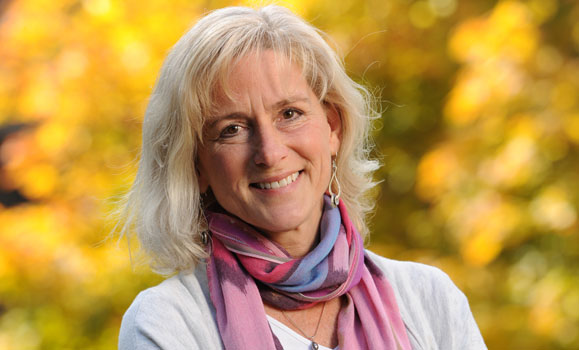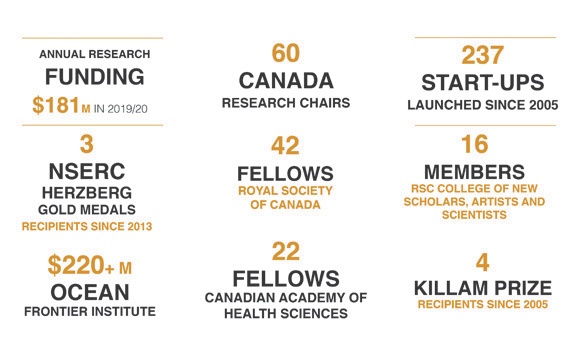║┌┴¤│ď╣¤═° is one of CanadaÔÇÖs world-leading, research-intensive universities. What made this possible? The answer is a sharp focus on research and innovation, as economic, environmental, health, societal and cultural shifts have presented the university with new opportunities.
║┌┴¤│ď╣¤═°is pioneering research in a wide array of disciplines, generating over $181 million in funding in 2019-20, an increase of $12.9M from the previous year. According to the latest data from the Canadian Association of University Business Officers (CAUBO), the university is home to 81% of all the research revenue awarded to universities in Nova Scotia. DalÔÇÖs external research funding comes from a variety of different sources, including the federal and provincial governments; foreign governments; industry; institutes, centres and networks; and not-for-profits ().
Through innovative research, Dal has added to the intellectual, social and economic capital of Nova Scotia and our region more broadly. Faculty members and research trainees are continuously seeking new and exciting opportunities for discovery, applied and community-driven scholarly or artistic work. They are collaborating together, with scholars from other institutions and in partnership with governments, industry, non-governmental organizations and communities, to develop new ideas and innovative advances, and create impact.
The result of many of these ideas and advances has been the creation of a wide range of businesses that generate jobs, wealth and stronger economies for Nova Scotia and Canada. While the impact of ║┌┴¤│ď╣¤═°research and innovation can be seen across all sectors of our economy, it is perhaps most visible and impressive in the ocean sector.
║┌┴¤│ď╣¤═°has a stellar international reputation as a powerhouse in ocean research. The universityÔÇÖs multidisciplinary approach and involvement in international research projects allows researchers to contribute to the most pressing ocean challenges of our time. DalhousieÔÇÖs excellence in this field is demonstrated by the (OFI), funded by the Canada First Research Excellence Fund. OFI is fostering the development of disruptive ocean technologies and data solutions to support the growing ocean tech industry in Atlantic Canada, as well as innovations needed to support transformation in the sustainable fisheries and aquaculture industries ÔÇö all while conducting groundbreaking work on the environment and sustainability.
ÔÇťI am incredibly honoured to serve this amazing institution with regional, national, and global impact,ÔÇŁ says Alice Aiken, DalhousieÔÇÖs vice-president research and innovation. ÔÇťOur success relies on providing an environment where everyone can achieve excellence, and one that encourages ground-breaking work while at the same time further expanding opportunities for pioneering research. The future of ║┌┴¤│ď╣¤═°is bright, and itÔÇÖs thrilling to be a part of it.ÔÇŁ
In this article, youÔÇÖll have the opportunity to learn more about DalÔÇÖs researchers who are having a big influence on the local, national and global landscape.
Aiding the global fight against COVID-19

In addition to being the director of the Canadian Center for Vaccinology (CCfV), Dr. Scott Halperin is a Professor of Pediatrics and Microbiology and Immunology at Dal, and the head of Pediatric Infectious Diseases at the IWK Health Centre. His research focuses on the diagnosis and treatment of preventable diseases.
In May 2020, the Prime Minister announced that the first Canadian clinical trials for a potential COVID-19 vaccine will be led by Dr. Halperin and his team of researchers at Dal.
The team is following up on work done by their industry partners from CanSino Biologics, which has already begun human vaccine trials in China. Dr. Halperin used the early data from those studies to support the successful application for a clinical trial in Canada. The Canadian Phase I study will further expand the information about this vaccine. The National Research Council (NRC) will work with the manufacturers so the vaccine can be produced and distributed ÔÇťhere at home,ÔÇŁ if it proves successful.
But his work doesnÔÇÖt stop there. Dr. Halperin is also looking at the policy implications of the virus.┬á In March 2020, he received funding from the Canadian Institutes of Health Research to study public policy and its social implications in the context of COVID-19. He and his colleagues in Bangladesh and China are exploring how individuals and communities understand and react to the disease and how public health policy affects them. Their findings will be used to improve the process by which public health policies are created and implemented.
ÔÇťUnderstanding how policy can be more effective will have implications not just for this outbreak but for future ones,ÔÇŁ says Dr. Halperin. ÔÇťWe learned a lot from the SARS outbreak and those learnings are already being used by policymakers. The importance is making sure policymakers have those learnings so mistakes are not repeated and the public health response is better with every outbreak.ÔÇŁ
A national and international leader in childrenÔÇÖs pain research

As the Tier 1 Canada Research Chair in ChildrenÔÇÖs Pain, and a Killam Professor in DalhousieÔÇÖs Departments of Pediatrics and Psychology and Neuroscience, Dr. Christine Chambers examines the role of developmental, psychological and social factors in childrenÔÇÖs health, with a focus on childrenÔÇÖs pain. She is also the Scientific Director of , a not-for-profit organization, funded by the Networks of Centres of Excellence, which has a mission to improve childrenÔÇÖs pain management by mobilizing evidence-based solutions.
Additionally, Dr. Chambers spearheads the initiative for parents, which generated 150 million content views worldwide in just one year, trended nationally on social media several times, and won multiple national and international awards.
In January 2020, she was appointed as the Scientific Director for the Canadian Institutes of Health Research (CIHR) Institute of Human Development, Child and Youth Health (IHDCYH). In this role she is working with her community to identify research priorities, developing funding opportunities, building partnerships and translating research evidence in policy and practice to improve the health of children and youth in Canada and around the world.
ÔÇť║┌┴¤│ď╣¤═°has provided the ideal environment and supports in which my research program was able to grow and flourishÔÇŁ, says Dr. Chambers. ÔÇťThe leadershipÔÇÖs commitment to equity, diversity, and inclusion, and their support and facilitation of innovation and partnerships, have been critical in supporting our success and in ensuring that our research is able to positively impact the lives of children and families.ÔÇŁ
Inspiring the next generation of explorers and scientists

Dr. Sara Iverson is globally recognized for her ground-breaking and interdisciplinary research, which has had implications for the conservation and management of mammal, seabird and fish populations.
Dr. Iverson is also the Scientific Director and Principal Investigator of the global . Headquartered at DalÔÇÖs Steele Ocean Sciences Building, OTN deploys state-of-the-art ocean monitoring equipment and marine autonomous vehicles (gliders) in key ocean locations and inland waters around the world, and is tracking more than 245 keystone, commercially-important and endangered species. The Network has established partnerships with a global community of telemetry users and stakeholders to document the movements and survival of aquatic animals in the context of changing environments, with the aim of providing better governance and stewardship of the worldÔÇÖs marine and freshwater resources.
OTN receives support from the (CFI) and is the is the only national research facility in Atlantic Canada to receive funding from CFIÔÇÖs Major Science Initiatives (MSI). Funding is also provided by , the (NSERC), the (SSHRC), as well as financial contributions from OTN partners across Canada and from around the world.
Dr. Iverson has studied the populations and physiological ecology of seals and sea lions throughout the Northwest Atlantic, Arctic, and North Pacific oceans, the Bering Sea and even the Hawaiian Islands. She has also studied polar bears across the Canadian Arctic, whales in the Beaufort and Chukchi Seas, and seabirds in the Bering Sea, Aleutian Islands and Gulf of Alaska.
Many young women have been trained in Dr. IversonÔÇÖs lab and field programs, and have been inspired by the huge, varied and fascinating fields that cut across marine biology. These women have gone on to occupy professional positions in academia, industry and the private sector, and are themselves now mentoring more young women to become the next generation of marine biologists.
ÔÇť║┌┴¤│ď╣¤═°has demonstrated its world leadership through its highly innovative interdisciplinary work that is spread across many faculties and departments and through its ground-breaking international research initiatives, which are working towards healthier and more sustainable oceans and communities across the globe," says Dr. Iverson.
To stay informed on research and innovation happening at Dalhousie, visit dal.ca/research.  

